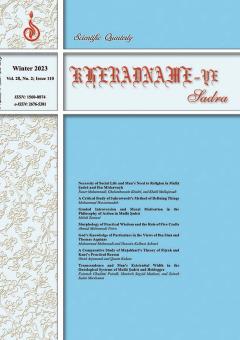-
-
List of Articles
-
Open Access Article
1 - Editor's Note
S. Mohammad Khamenei -
Open Access Article
2 - Necessity of Social Life and Man’s Need to Religion in Mullā Ṣadrā and Ibn Miskawayh
Naser Mohamadi Gholamhossen Khedri Khalil Mollajavadi -
Open Access Article
3 - A Critical Study of Suhrawardī’s Method of Defining Things
Mohammad Hosseinzadeh -
Open Access Article
4 - Graded Introversion and Moral Motivation in the Philosophy of Action in Mullā Ṣadrā
Mehdi Zamani -
Open Access Article
5 - Morphology of Practical Wisdom and the Role of Five Crafts
Ahmad Mohammadi Peiro -
Open Access Article
6 - God’s Knowledge of Particulars in the Views of Ibn Sīnā and Thomas Aquinas
Mohammad Mahmoodi Hossein Kalbasi Ashtari -
Open Access Article
7 - A Comparative Study of Muṭahharī’s Theory of Fiṭrah and Kant’s Practical Reason
Omid Arjomand Ghasem Kakaie -
Open Access Article
8 - Transcendence and Man’s Existential Width in the Ontological Systems of Mullā Ṣadrā and Heidegger
Fatemeh Ghadimi Paindeh Monireh Sayyid Mazhari Zeinab Sadat Mirshamsi
-
The rights to this website are owned by the Raimag Press Management System.
Copyright © 2017-2026







